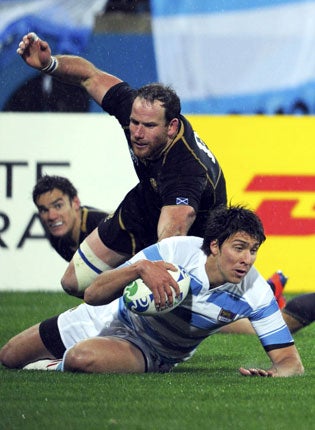James Lawton: Scottish spirits sink but at least there was an even field

It will be some time before we know if this is truly a great World Cup of rugby or just some inordinately meandering march to record television and advertising profits.
In the meantime, though, we can at least thank God for the gifts bestowed by filthy nights in Auckland and Wellington.
The first brought us an appropriately magisterial celebration of his 100th cap by New Zealand skipper Richie McCaw.
The second was hard on Scottish spirits and not least the splendidly refrigerated nerve of the oddly substituted Ruaridh Jackson, but when Argentina won with a superbly executed try they did it on the kind of field which has become increasingly precious as this tournament wears on.
This is to say an even one, on which both teams played at maximum strength and with equal opportunity. Coming 24 hours after the latest absurdity – 18th ranked Romania fielding a virtually second-string team against the flexing might of England – this was a most welcome reversion to one of the most basic requirements of world-class competition. This, surely, is to have teams sharing the incentive to produce their strongest teams and most competitive instincts.
Of course the Romanians, with a degree of contrition which should more properly have been assumed by the organisers, carefully explained that victory against Georgia in a match scheduled for just four days after the collision with England would guarantee them qualification for the next World Cup, at least in its current bizarre format.
So what should they have done? Tied their best team to the mouth of the England cannon, and maybe reduce the losing margin by, say, 30 points, or do something much more to their long-term benefit, which was to reduce England's challenge to nothing more demanding than a training workout?
While Romania agonised over their moral dilemma for roughly 1.2 seconds, Argentina and Scotland found themselves fighting for their lives in the here and now of a competition which may yet become truly memorable.
The result never threatened to be a classic but it had the supreme virtue of being a genuine contest, one whose possibilities were much more intriguingly balanced than Scottish coach Andy Robinson's assertion that his team were in "total control" might have suggested.
In other circumstances you might fear for the continued vital interest of Scotland, who are almost certain to be heading home next weekend, but with England their last group opponents in the old cathedral of Eden Park there is no doubt considerable amounts of blood and angst are still to be spilled.
It means that Scotland can again whip up old grievances along with the more recent one that it was an English referee, the former infant prodigy Wayne Barnes, who dismissed their claims that Argentina's heroic Felipe Contepomi was offside by a considerable chunk of the North Island when he rushed Dan Parks into an errant drop goal attempt in the last moments.
This was no doubt a legitimate moan, certainly one of more substance than the complaint of Robinson that the winning try of Lucas Gonzalez Amorosino was a direct gift of Scottish defence. It's true that Chris Paterson, Mike Blair and Jim Hamilton could not find between them a significant tackle. This, however, is to ignore the brilliance of Amorosino's footwork and timing.
Some claimed it was the try of the tournament and certainly it was something to place alongside the brilliant hauteur with which the All Blacks pole-axed the French, at least temporarily, the night before.
This was breathtaking enough to lend more credence to the belief that this really is the World Cup in which the New Zealanders remember what they are supposed to represent on the rugby field.
Sean Fitzpatrick, one of the All Black heroes in their only World Cup triumph in 1987, has a theory that the national trauma that has grown down the years with the failure to reproduce that first success has been supplanted by the real-life pain of the earthquakes that devastated Christchurch and the surrounding plains.
It may mean, Fitzpatrick surmises, that the challenge of merely playing rugby of inherent genius can be placed in an entirely different perspective. We will see soon enough but there is certainly no absence of circumstantial evidence.
Arguments that the French, the tormentors of the All Blacks in 1999 and 2007, were operating on their own agenda and would save their greatest effort for a possible meeting further down a tortuous road were, of course, rife after the 37-17 defeat.
McCaw was, naturally, unimpressed by such theorising. It also has to be said that if the French were indeed lying low, their coach Marc Lièvremont deserves some kind of award for his impressive contribution to the plot. When the All Blacks ran in their third try in 19 minutes, he gave an extremely passable impression of someone gazing into the barrels of a firing squad. Next time, if there is one, he might just choose to bring along a blindfold.
Subscribe to Independent Premium to bookmark this article
Want to bookmark your favourite articles and stories to read or reference later? Start your Independent Premium subscription today.

Join our commenting forum
Join thought-provoking conversations, follow other Independent readers and see their replies